Postpartum Hair Loss Is Real — Here's How to Deal with It
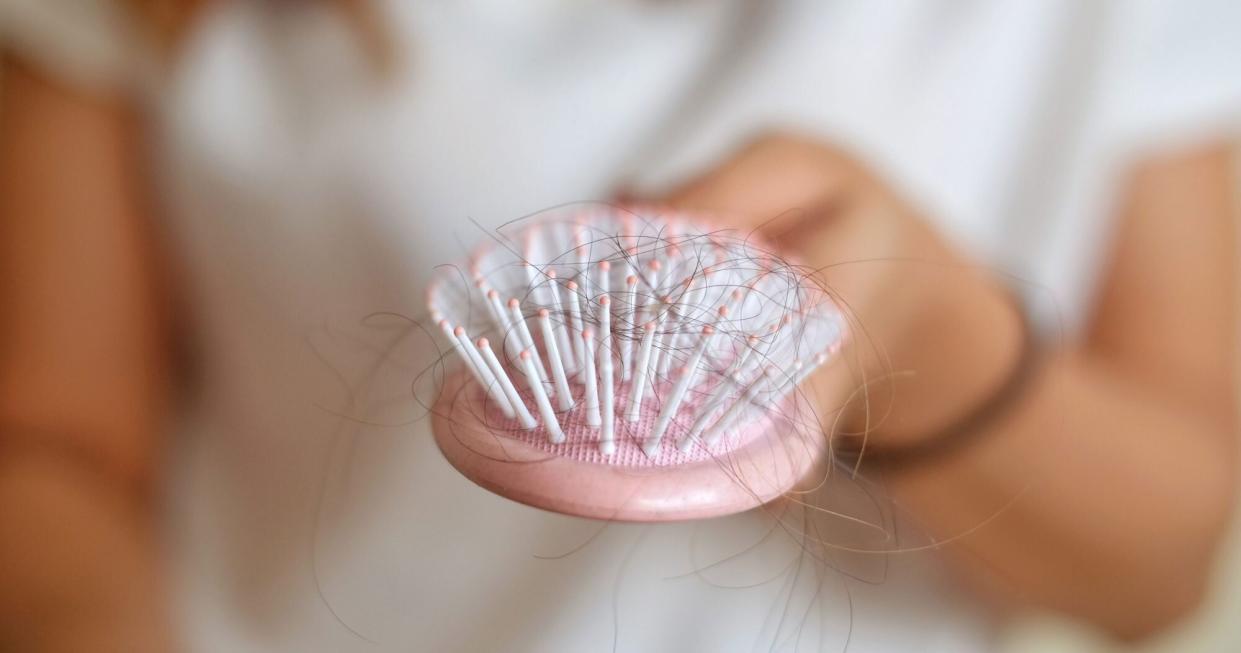
Chalisa Thammapatanakul/EyeEm/Getty
A few months after having my daughter, Sunday, running my fingers through my hair in the shower one day while shampooing, I noticed a lot of hair come out the other end with my fingers. When I got out of the shower to brush my hair? The hair just… kept...coming. And the shedding went on like such for months.
There are lots of things no one tells you about having a baby—the 24/7-ness of new motherhood, the night sweats, the bleeding — but for many new moms, postpartum hair loss is shocking, scary, and unexpected. (It's also totally normal, common, and expected BTW, but more on that later.)
But what exactly causes you to go from luxurious locks during pregnancy to shedding what can feel like the majority of your mane every time you shower post-baby? And how long does this postpartum hair loss last? Here, a look at postpartum hair loss — its causes and duration — as well as ways to nurture your strands and get your hair back on track ASAP.
What Is Postpartum Hair Loss?
Essentially, postpartum hair loss is just hair loss that's related to childbirth, says Shani Francis, M.D., a dermatologist and chief wellness officer of Ashira Dermatology in Gurnee, IL. Sometimes it's referred to as "excessive hair shedding," according to The American Academy of Dermatology (AAD). In the months following delivery, many new moms notice that they're losing more hair than usual, and that's pretty much exactly what's going on.
"It is normal to shed up to 100 hairs a day," says Anabel Kingsley, a trichologist and brand president at Philip Kingsley. When you're pregnant, however, you may lose as few as 15 hairs per day. That's because the high levels of estrogen (that come with pregnancy) keep hair in the anagen or "grow" phase longer than usual, explains Kingsley. Hence why you might notice thicker, fuller hair in pregnancy—and very little hair loss.
That can all change once you bring your baby into the world. With childbirth, in most instances, there is a rapid hormonal shift, including a serious drop in estrogen. And that prolonged "grow" phase your hair was in during pregnancy? It rapidly changes to a telogen phase, aka a resting phase when strands are released and fall out, explains Dr. Francis—and then hair sheds. In fact, up to 50 percent of your hair can enter the resting phase of the cycle postpartum, she says. So, after having a baby, it's not unusual to lose up to 300 hairs per day, says Kingsley. (Related: This Is Why You're Losing Your Hair During Quarantine)
Hormonal changes can disrupt the normal hair cycle in other ways, too, adds Dr. Francis. "Typically, each of our 100,000 scalp hairs has a unique and individual hair cycle or clock," she says. "However certain triggers can synchronize hairs and reset the clocks to shed together." What that means: You notice a lot of shedding all at once.
While these quick hormonal changes that rework the hair's growth and rest cycle are one of the biggest reasons behind postpartum hair loss, excessive shedding can also be caused by an iron deficiency (significant blood loss during delivery could be a triggering event), the sheer emotional and physical stress of giving birth, dietary changes, starting, stopping, or switching birth control, and sleep deprivation, explains Dr. Francis.
As for the question you're likely still wondering: how long does postpartum hair loss last? Well, it usually starts to kick in a few months after the triggering or stressful event (in this case, childbirth). Shedding tends to peak around four months postpartum, according to AAD, and within six to nine months, your hair tends to regain its normal fullness. "Timing is everything," says Dr. Francis. "Any hair loss that is concerning or not recovering within nine to 12 months, seek help from a board-certified dermatologist." She also recommends reaching out to a doc if you notice redness, itching, tenderness or scalp discomfort, bumps, flakes, or rashes.
But remember: For the most part, experts say that postpartum hair loss—while it can be shocking and scary—is normal and temporary. "You will not lose more than 50 percent of your hair," says Dr. Francis. "So even though it seems that you will go bald at any moment, you won't." (See also: Asking for a Friend: How Much Hair Loss Is Normal?)
How to Help Postpartum Hair Loss
First, the bummer: There's not exactly much you can do to prevent postpartum hair loss from happening. "Once the triggering event happens and that shifts the hair cycle, there is nothing you can do to prevent it from coming out," explains Dr. Francis.
However, there are steps you can take to make sure it doesn't continue for longer than it should. In large, this comes down to making sure you're doing your best to take care of yourself post-pregnancy by eating healthy, resting (and sleeping!) when you can, and letting your body heal.
Specifically, diet can play a big role, says Kingsley. A biggie nutrient? Protein. "Proteins are used to build tissue cells, including the cells of your hair, skin, and nails," she explains. "Eighty to 85 percent of your hair is composed of a protein called keratin. Dietary proteins are your hairs' building blocks—they make your hair strong and help keep it in its growing (anagen) phase."
Other key nutrients, according to Kingsley? L-lysine, an amino acid that helps the body form collagen to give hair shape and elasticity (found in foods such as red meat, chicken, eggs, beans, and cottage cheese); B12, which helps your body make enough red blood cells to transport oxygen to your tissues (found in foods such as milk, eggs, fish, poultry, and fortified cereals); and vitamin D, which plays a role in the creation of hair follicles (found in milk, portobello mushrooms, sardines, and egg yolks).
But ultimately, again, hair loss can be triggered by a few different events at once, making it truly individual. So if you're noticing more strands coming out than seems normal (read: clumps every single time you shower), working with a board-certified dermatologist or trichologist can be helpful in figuring out specific triggers that have to do with being postpartum or other more general triggers that could be contributing to the loss, says Dr. Francis. (Related: Everything You Need to Know About Hair Loss (Like How to Stop It))
In the meantime, however, products can help make your mane look and feel thicker until your hair regains its normal fullness. Here are a few great buys — from supplements to hair care supplies — to add to your postpartum hair-care routine.
Nature Made Prenatal Multivitamin DHA Softgel
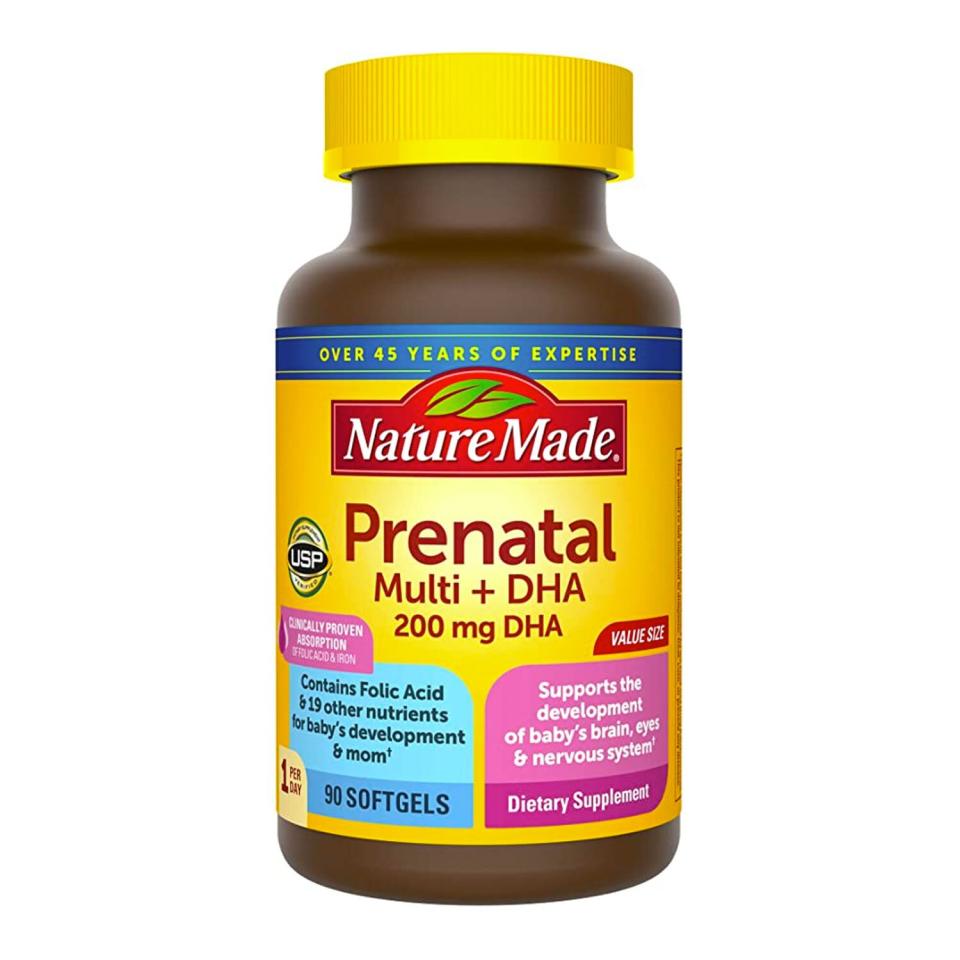
Nature Made
While prenatal vitamins won't thwart the hormonal changes that initially trigger postpartum hair loss, many are worth taking in the so-called fourth trimester as well since they deliver a good dose of iron, which can be particularly helpful if you lost a lot of blood during delivery. In order to absorb iron, however, your body needs vitamin C and, good news, this prenatal and postnatal vitamin also has plenty of it. But don't stop there: Make sure you're also filling up on vitamin C-rich foods such as red peppers, citrus fruits, tomatoes, and leafy greens. (See also: Should New Moms Take Postnatal Vitamins After Childbirth?)
Buy It: Nature Made Prenatal Multivitamin DHA Softgel, $26, walgreens.com
Regoxidine Women's 5% Minoxidil Foam
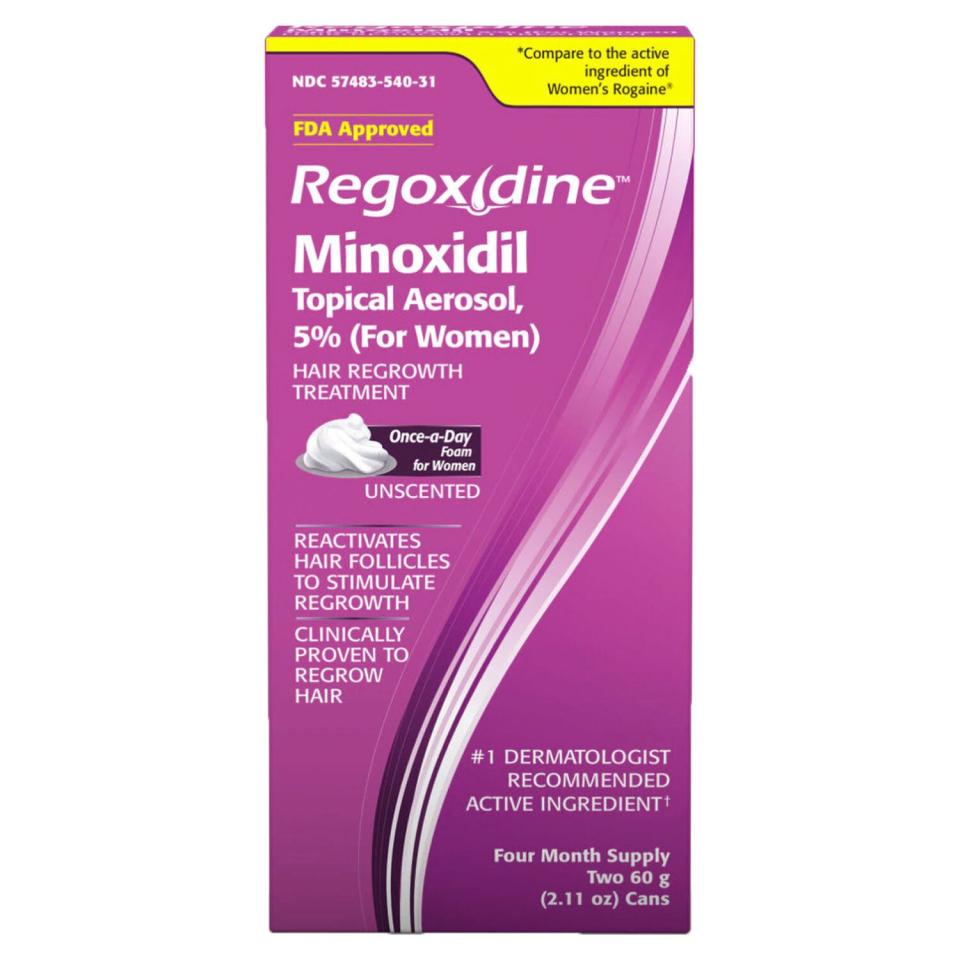
Amazon
Minoxidil is an ingredient that might be useful in helping to reset hairs in the "rest" phase back to the "growing" phase faster, says Dr. Francis. "It's a topical medication that opens blood vessels and is theorized to stimulate and improve blood flow to the hair follicle when applied on the scalp." Just note: When you start using this product, you might notice a temporary increase in shedding (ugh) as a result of your hairs transitioning between phases, she cautions. Typically this lasts two to four weeks. "Think of it as all the hairs that would have shed being gathered up and stimulated to transition to growing simultaneously," adds Dr. Francis.
Know that Minoxidil can cause rashes in some people, so if you notice any redness, itchiness, tenderness, scalp discomfort, bumps, flakes, or rashes stop using it, stat. And you should avoid it if you're nursing, says Dr. Francis. Otherwise, you can use a half capful on a dry scalp every day.
Buy It: Regoxidine Women's 5% Minoxidil Foam, $35, amazon.com
Oribe Shampoo for Magnificent Volume
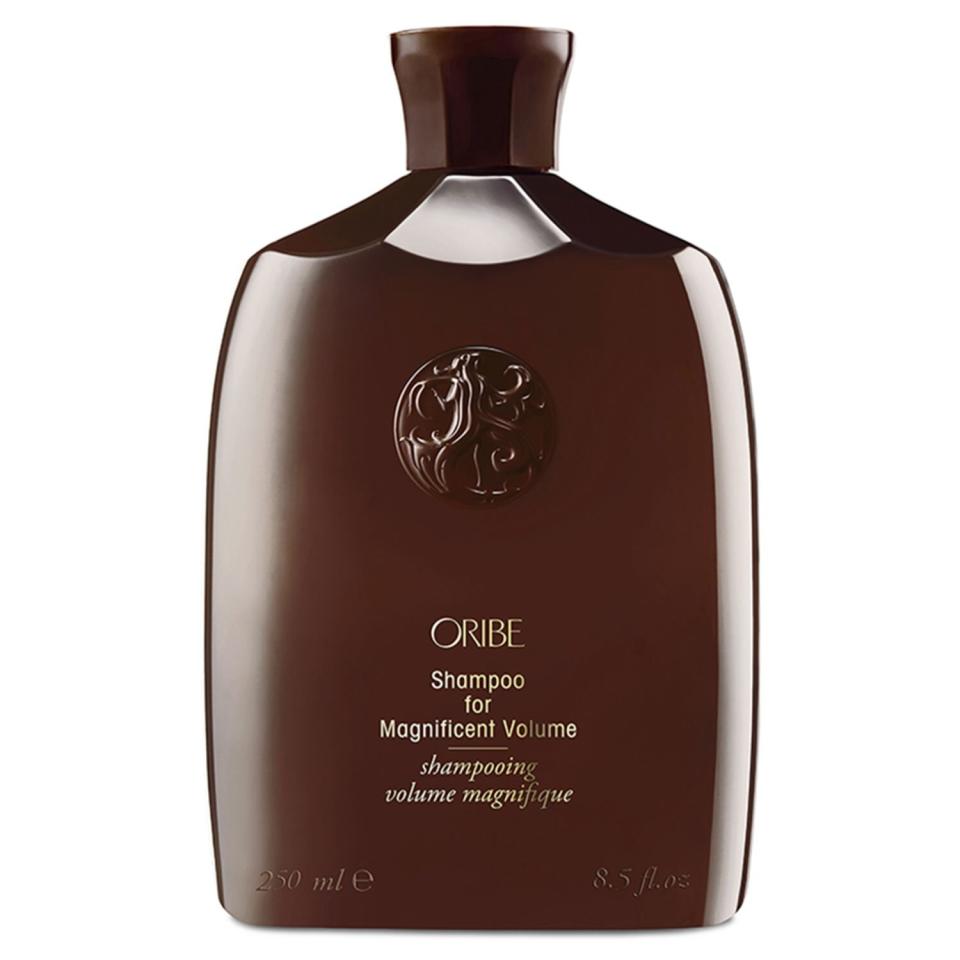
Oribe
The AAD recommends using volumizing shampoos postpartum since they tend to contain ingredients like protein that coat the hair, making the hair look fuller. This one from luxe favorite Oribe has both lupine protein (which comes from the same plant as lupini beans, btw) and saw palmetto extract, which is thought to naturally restore and balance your scalp, stimulating your follicles for thicker locks. (Plus, who can complain about a little postpartum spa-like splurge?)
Buy It: Oribe Shampoo for Magnificent Volume, $46, amazon.com
OGX Thick & Full Biotin & Collagen Shampoo
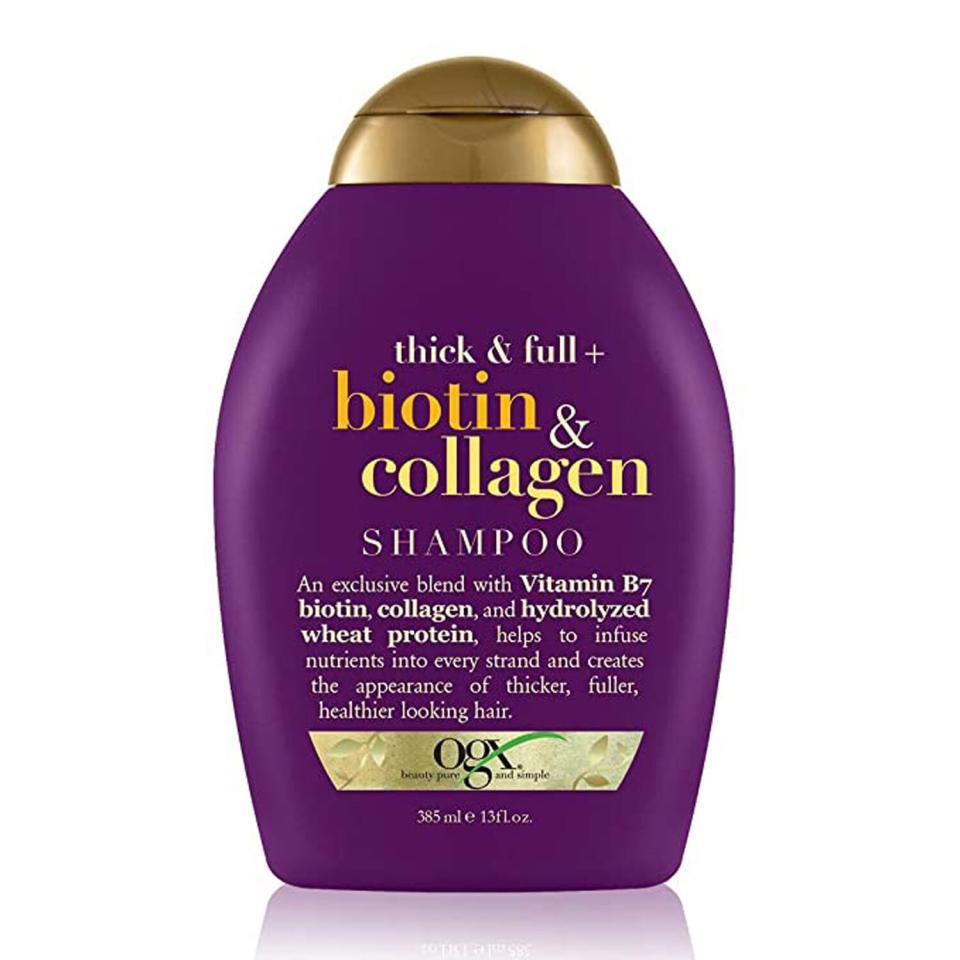
Walgreens
Easy to find (read: online and at most major drugstores) OGX is a top pick when it comes to postpartum hair loss products because it works for your locks and your budget. With strand-strengthing ingredients such as biotin, this bad boy is designed for hair growth and—a plus!—is super lightweight. After all, the AAD suggests skipping any shampoo that's labeled as a "conditioning shampoo" since it might be too heavy for postpartum hair, weighing you down.
Buy It: OGX Thick & Full Biotin & Collagen Shampoo, $7, walgreens.com
Living Proof Full Conditioner
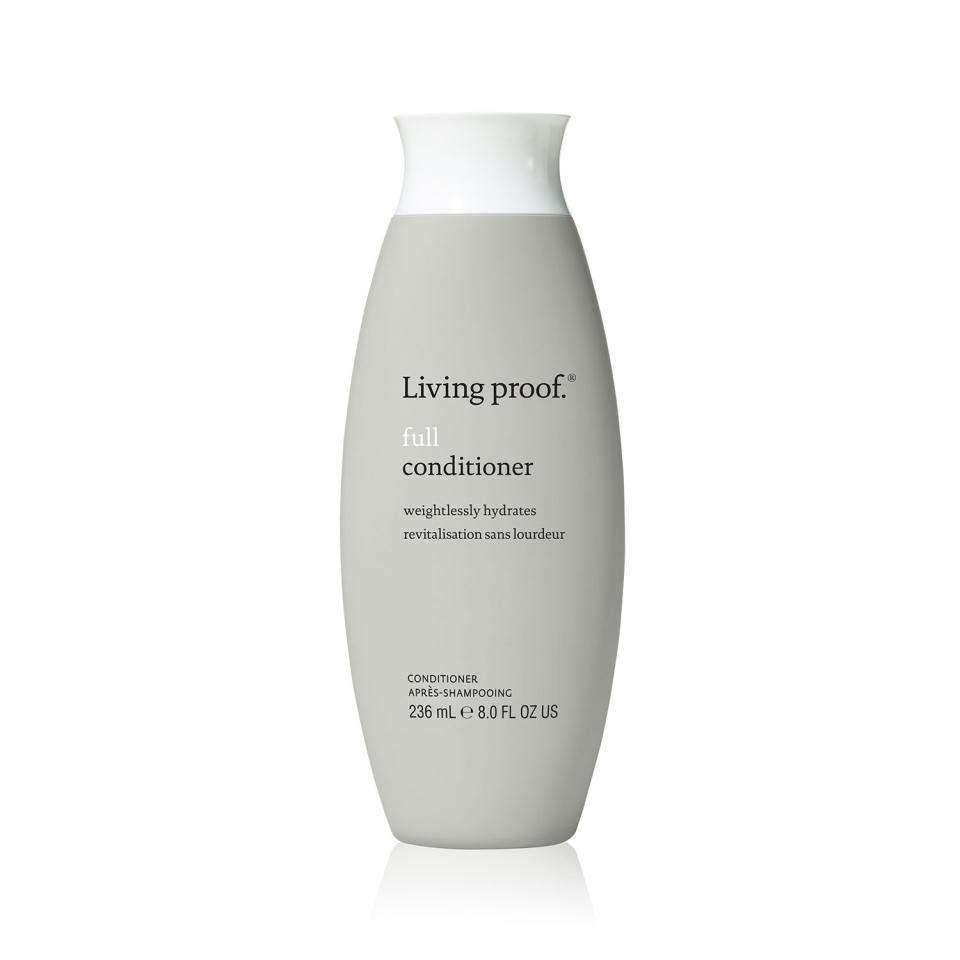
Living Proof
No matter your type of hair, using a conditioner that's specifically formulated for fine hair a good idea if you're dealing with postpartum hair loss since it tends to be lighter—and thus, won't weigh down your hair and "make it look limp," according to the AAD. "With any type of excessive hair shedding the overall volume tends to be 30 to 50 percent reduced," says Dr. Francis. "Even if your hair was not fine prior to the shedding, the overall diminished volume may change your hair product needs. It's a good idea to try lighter-weight products to see if your hair responds to or looks better with those, otherwise, there's no true harm in using what you have." Living Proof's color-safe pick with detangling powers is a bit pricier than other conditioners but it's super lightweight and works to soften your struggling strands without leaving you feeling heavy. (Related: Ashley Graham Has Been Relying On This Scalp Serum to Help with Hair Loss)
Buy It: Living Proof Full Conditioner, $28, livingproof.com
Rahua Voluminous Conditioner
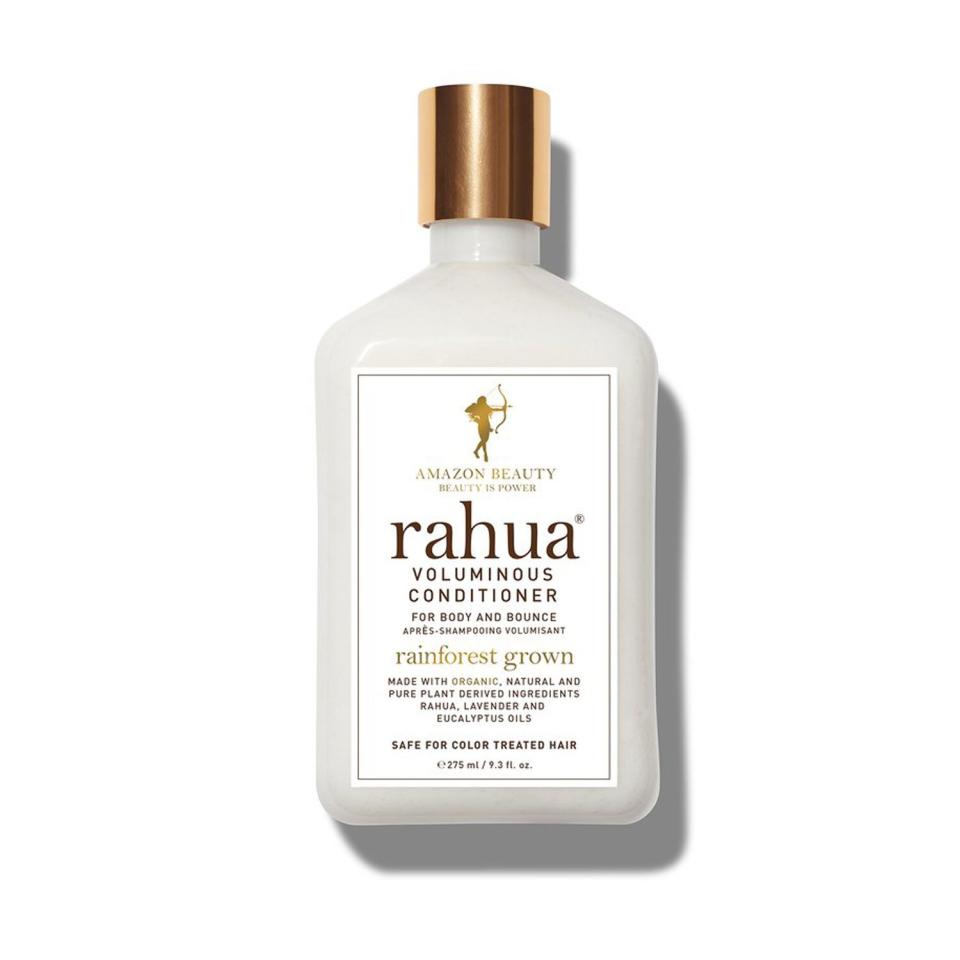
Amazon
Rahua's volumizing conditioner is pretty much weightless (read: it conditions super lightly) and is made for mamas who are picky about what they put in their hair and skin. The product is free of parabens, sulfates, and phthalates—plus it's vegan and cruelty-free. As with the other conditioners on this list, apply only to the ends of your hair to avoid weighing down your locks, according to the AAD. And before you turn that shower knob toward off, take an extra minute to enjoy the yummy and calming scents of lavender and eucalyptus.
Buy It: Rahua Voluminous Conditioner, $36, amazon.com
R+Co Dallas Biotin Thickening Conditioner
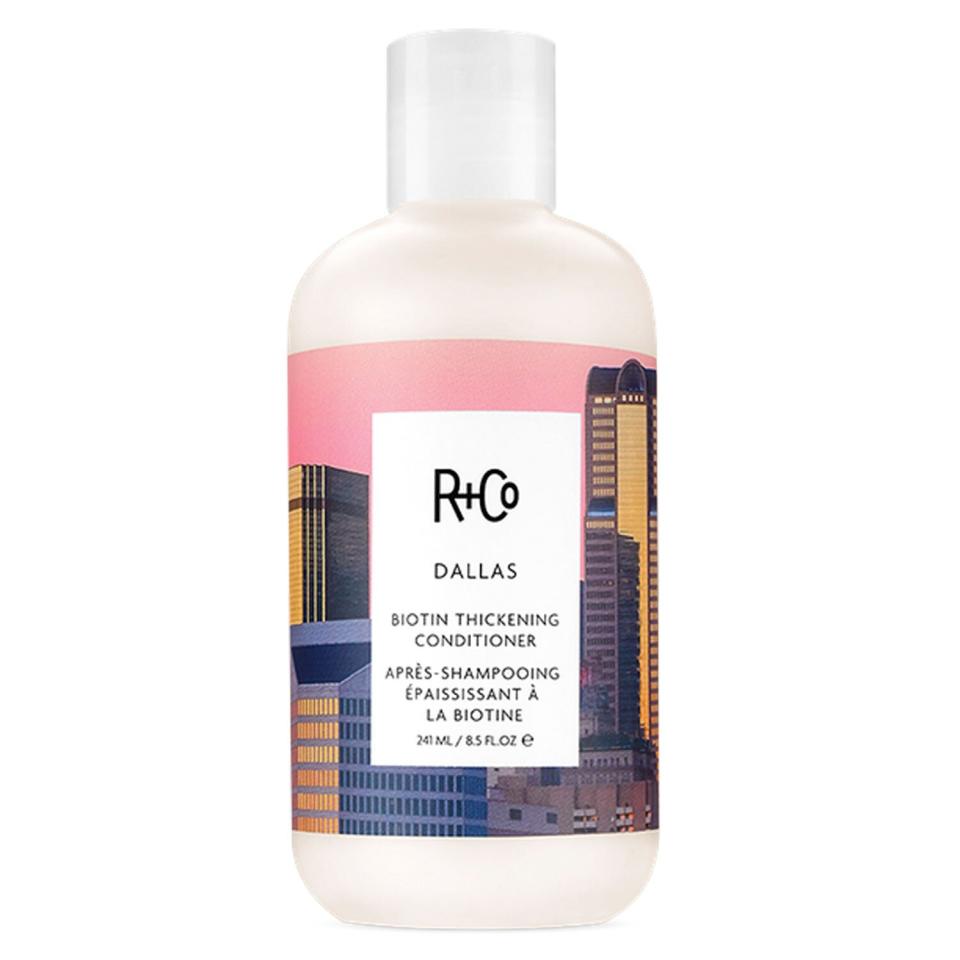
R+Co.
At this point in the article, you (hopefully!) know that the lighter the hair care product, the better for postpartum hair loss. So intensive conditioners are a hard pass, as they "tend to be heavier on your hair," explains Dr. Francis. Instead, opt for an easy-going conditioner, such as this one that boasts a star-studded ingredient list featuring biotin for strengthening strands, saw palmetto extra for boosting body or volume, and coconut oil for its thickening powers. Plus, anything that's available via Amazon Prime and can be on our doorstep in two days to help in a pinch is a win in arguably everyone's books.
Buy It: R+Co Dallas Biotin Thickening Conditioner, $27, amazon.com

